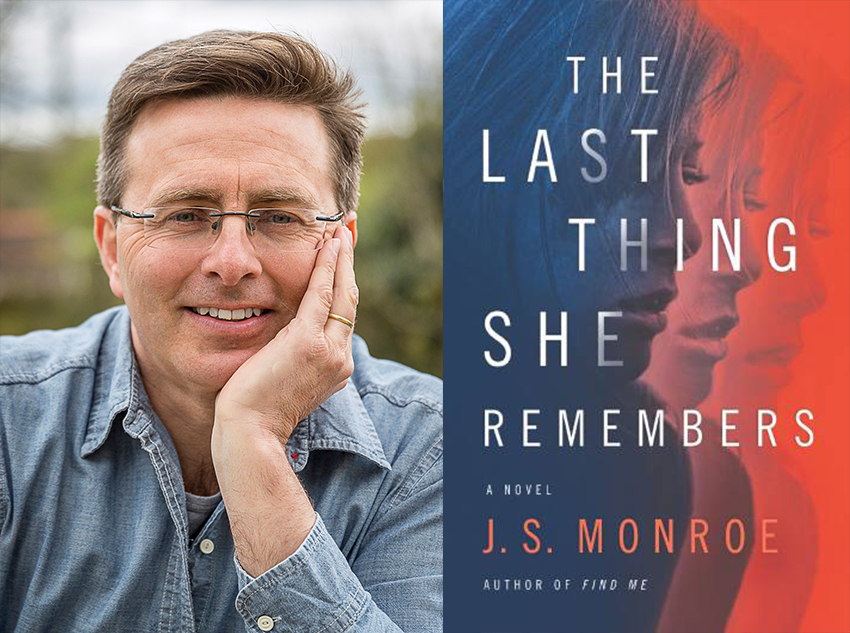The Fear of Forgetting
By J.S. Monroe
May 28, 2019
My new psychological thriller, The Last Thing She Remembers, begins with a woman who arrives off the train in a remote village in South West England. She is unable to remember her own name and is without any form of identification, having lost her bag at the airport. Passport, bank cards, mobile phone—all gone. All she has is a train ticket and a vague sense that she lives in the village. How did she get there? And who is she? When she approaches the house that she thinks is hers, she peers in through the window and sees a young couple preparing dinner.
I was haunted by such an image when I was commuting from my own rural village in Wiltshire to London, where I worked for a national newspaper. It was a stressful time in my life. I had a young family and the trains were always delayed. When I returned late, I often wondered what it would be like if I glanced through the window of my own house, only to see another family preparing for bed.
It turns out that the woman in my novel has psychogenic amnesia, a not uncommon, usually temporary condition brought on by stress and anxiety. The village doctor also suspects that she might be suffering from something called a dissociative fugue. This is a much rarer form of amnesia, once known as a fugue state. The sufferer often travels long distances (the latin word fuga means flight), forgets who they are and adopts a new identity.
When I returned late, I often wondered what it would be like if I glanced through the window of my own house, only to see another family preparing for bed.
I spent a lot of time researching psychological experiments when I was writing Find Me, my first J.S. Monroe thriller. The Last Thing She Remembers required considerable neurological research and my local doctor was incredibly helpful, sharing tips on how she would assess the extent of a patient’s memory loss. The most important thing is to establish if it has an organic cause—a head injury, stroke, haemorrhage, brain tumour, drugs, etc—or if it’s a case for the psychiatrist.
I particularly enjoyed reading around the subject of amnesia. It was news to me that Jason Bourne, Robert Ludlum’s brilliant creation and the protagonist of the subsequent Bourne films, was most likely named after a 19th century American preacher who suffered from a dissociative fugue.
Jason Bourne, of course, is introduced as a man who has no recollection of his past and who only slowly begins to recall snippets of his previous life as David Webb. Ansell Bourne, an evangelical preacher in Rhode Island, enjoyed a certain amount of notoriety when, in 1887, he traveled to Pennsylvania by horse, called himself A.J. Brown and set himself up as a shopkeeper selling stationery.
It wasn’t until two months later that ‘A.J. Brown’ woke up one morning, confused by his whereabouts. He only knew himself to be Ansell Bourne and had no recollection of the preceding two months. His case became well-known in medical circles and is often cited as one of the earliest documented cases of a dissociative fugue.
It was also interesting—and disturbing—to read about the amnesic effects of fast-acting benzodiazepines such as Xanax that are being used recreationally in nightclubs. It causes blackouts—total memory loss that can extend from several minutes before it’s taken to many hours afterwards, making users vulnerable to date rape. And who knew that the figs of the Bodhi—or peepal—tree are known to improve memory? As well as being rich in amino acids, they contain high levels of serotonin and, in powder form, can reduce anterograde and retrograde amnesia by modulating serotonergic neurotransmission in the brain.
We all forget things and, as we get older, begin to wonder if it’s innocent forgetfulness or early onset Alzheimer’s. I wanted to push those anxieties to the limit in my new book and there’s nothing more frightening than not being able to recall your own name. It’s unsettling for others too.
Everyone in the village has a theory about the mystery woman who turned up in their midst. A local journalist is struck by her uncanny resemblance to his first girlfriend; someone else thinks she might be a Russian sleeper (the village, after all, is not far from Salisbury, where the Novichok nerve agent attack too place); and the doctor begins to wonder if she’s a local woman who was sent to Broadmoor, a high-security psychiatric unit, after committing a violent murder 12 years earlier.
The truth might be any one of these theories—or it might be something far more sinister. If only someone could remember her name…

About The Last Thing She Remembers:
Who can you trust if you don’t know who you are?
She arrives at the train station only to realize her bag had been stolen – her passport, credit cards, laptop, house key, now all gone. And even more disturbing, when she goes to report the incident, she can’t recall her own name. All she has on her is a train ticket home.
Suffering from stress-induced amnesia, the woman without a name is a source of mystery when she appears at the sleepy Wiltshire village where she thought she lived. She quickly becomes a source of conspiracy and fear among the townspeople. Why does one think he recognizes her from years earlier? And why do the local police take such a strong interest in her arrival?
From the critically acclaimed author of Find Me comes a shocking new tale of dark pasts and deception, leaving us breathlessly analyzing the role memory plays in defining who we are – and who others think we might be.
The Last Thing She Remembers by J.S. Monroe is published by Park Row Books.
*Author photo credit to Hilary Stock
